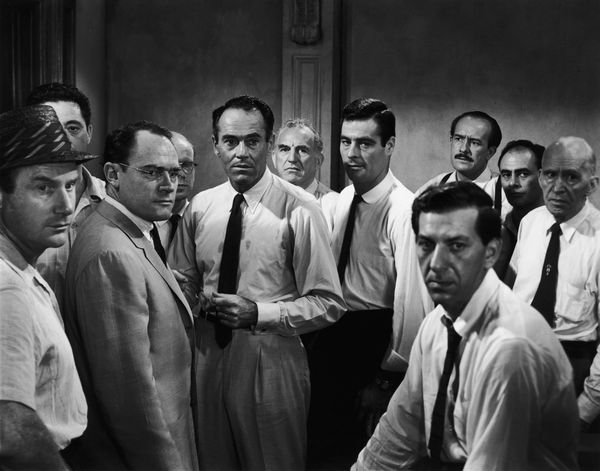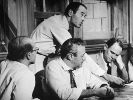Eye For Film >> Movies >> 12 Angry Men (1957) Film Review

When one of the jurors in 12 Angry Men says, "I'm sick and tired of facts, you can twist them any way you want", it's a sharp reminder that although Reginald Rose and Sidney Lumet's drama about a jury deciding on the death penalty is 60 years old this year, it has lost none of its observational sharpness and still speaks of issues of concern that affect us today. Originally shot as a live television drama as part of the Studio One anthology series in 1954, three years later Rose had beefed up the screenplay to its longer 96-minute running time. If you're interested in the original, then you're certainly in for a treat with the latest Criterion Collection release, as both an analysis of the original and the live teleplay itself are included in the extras.
In the 1954 version, the jurors really are angry from the outset but the chief initial mood in the later screen version is one of the everyday and boredom. The judge (Rudy Bond) in the courtroom seems as though he can hardly be bothered reading the jury the rights and wrongs of their decision, playing with a pen and reciting the instructions in a monotone. Once the 12 men reach the jury room, the atmosphere is immediately oppressive. We barely need to be told "this is going to be the hottest day of the year", as most of them are sweating, we immediately learn the fan in the room doesn't work and they are desperate to open a window. In short, the perfect cauldron in which to play out this deliberating dozen's cut and thrust as prejudices surface and allegiances shift.

Lumet uses his confined space to his advantage, allowing the camera rove over pockets of the men to illustrate the mini alliances that form and break and the pocket confrontations as Juror 8 (Henry Fonda) refuses to immediately condemn the young Hispanic accused to death for the murder of his father. Within the cramped setting of the jury room, the drama is intensified - whether it's Fonda's juror re-enacting the movements of an eye witness or the sudden production of a knife. In this regard, the film continues to be highly influential, with directors including Michele Placido (7 Minutes) citing it as an influence.
The acting is a masterclass. We may not know the names of the men in the room, but the combination of sharp scripting from Rose and focused performances gives us a window into the jurors' souls - from Jack Warden's sports fan, who is happy to vote either way so long as he makes his game, to Lee J Cobb who overlays his anger and hurt over estrangement with his son on the current decision and Ed Begley's thinly veiled racist.
Rose offers insight into each of the 12, but makes sure that dialogue is to the fore, so that the action doesn't become static. At its centre is Fonda, who cleverly underplays his character, making him seem all the more calm in the face of the others and their rush to judgement. You don't have to see echoes of the McCarthy trials (also present in Rose's Tragedy In A Temporary Town) or any other of the references contemporary to the Fifties in which it was written to be able to appreciate the sheer audacity of the central idea and be gripped by its interrogation of the concept of "beyond reasonable doubt".
Reviewed on: 29 May 2017
















